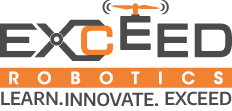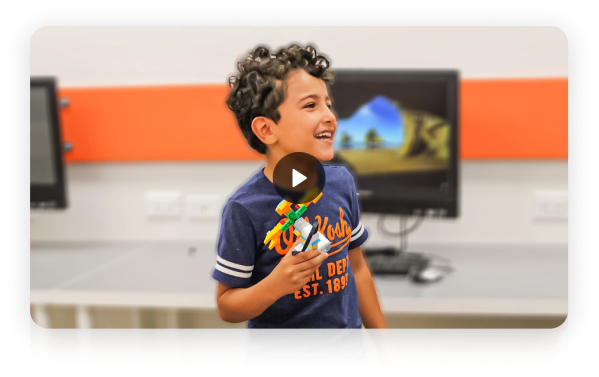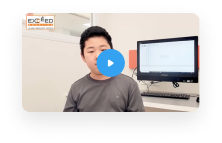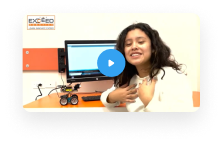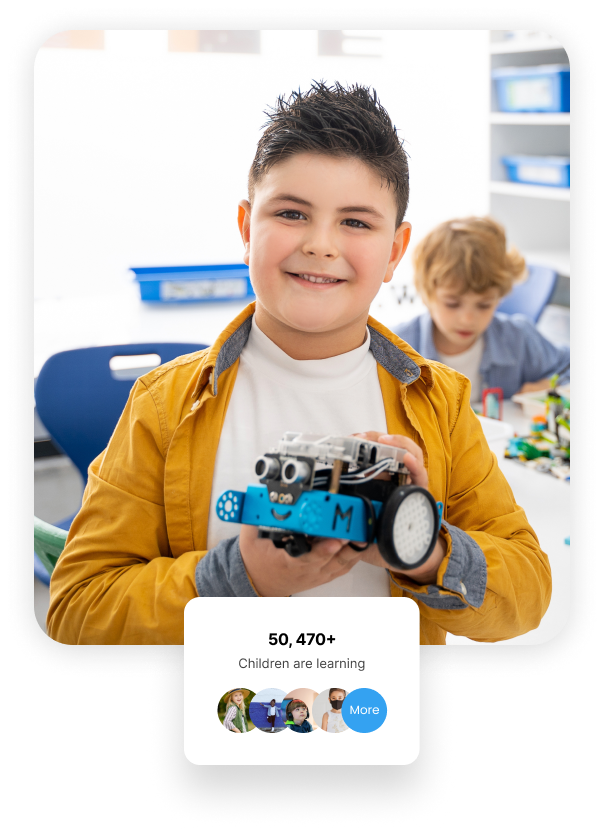
Your Kids will Learn ?

Coding
students can learn the C Language in an engaging and interactive manner by using it to the control robot through various sensors.

Electrical Design and 3D Printing
To build robots, student must learn design software and 3D printing. Additionally ,they learn about circuits to create more intricate robot.

Problem-Solving Skills
At the start of each class instructor provide a lesson, after which students work on their project independently. To complete the task, student must think,code ,build and test their robots.

Preparing for the future
Robotics classes help children learn about real-world and career based skills such as programming, engineering and design which can prepare them for lecture careers in STEM fields.
Your Kids will Learn ?

Coding
students can learn the C Language in an engaging and interactive manner by using it to the control robot through various sensors.

Electrical Design and 3D Printing
To build robots, student must learn design software and 3D printing. Additionally ,they learn about circuits to create more intricate robot

Problem-Solving Skills
At the start of each class instructor provide a lesson, after which students work on their project independently. To complete the task, student must think,code ,build and test their robots.

Preparing for the future
Robotics classes help children learn about real-world and career based skills such as programming, engineering and design which can prepare them for lecture careers in STEM fields.
Register a free trial class
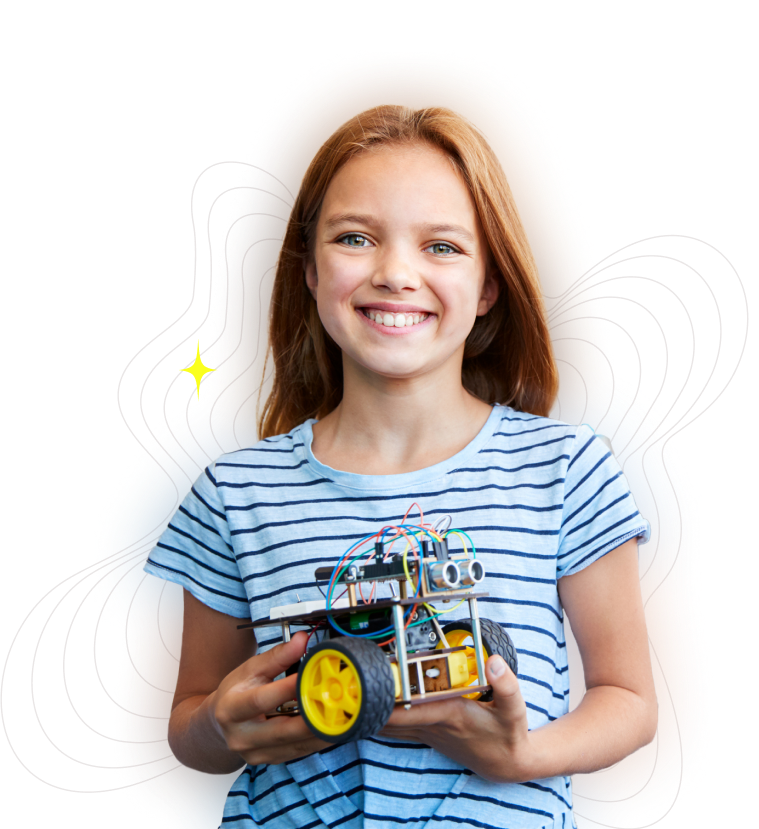
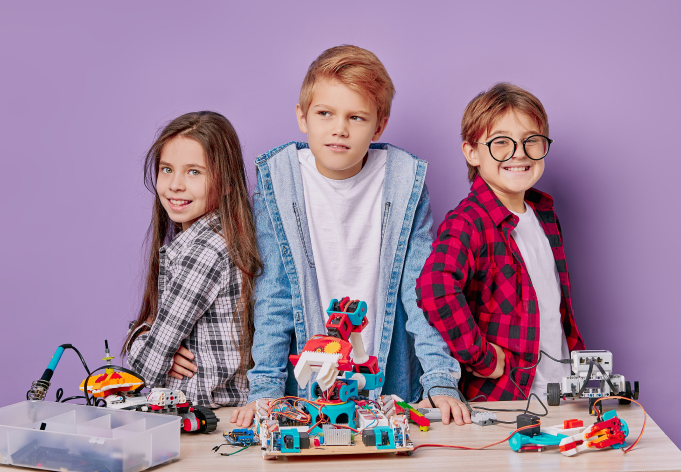

Why Exceed ?

Trained Instructors
Our instructor undergo a thorough training to ensure children receive an exceptional learning experience

Hands-on STEM Projects
At Exceed, we believe that fun is an integral part of the learning journey. Our students have access to a range of hands-on learning opportunities

Small Student Ratio
To ensure exceptional student experience, we maintain 6:1 student to instructor ratio
Here’s how it works

Register a free trial class
Offered every week at all location in GTA. This 1 hour hands-on class give your child glipmse of Robot Programing
.png)
Get a schedule for the upcoming term
We offer classes on various days and times to help you choose the schedule that works best for you.This is often most challenging step! juggling all kids activites.
.png)
Enroll in program
Once you have selected a preferred day and time for the program,you are all set. You just need to wait untill its begin,but don't worry ,once you start you don't have to stop
Courses
DISCOVERY 1: ECO-QUEST
Prerequisite: ages 7+ (no experience required) The first robotics course in the Discovery Robotics curriculum involves students building their own programmable Lego robots each class and using their IPAD to code. Every class begins with the introduction of a particular concept followed by students assembling, programming and conducting experiments. For example, to teach the concept of speed vs. wheel size, students build, program and time their race car when attaching large wheels and small wheels.
DISCOVERY 2: MECH-TREK
This second robotics course focuses on mechanical concepts taught by building machines using a different Lego platform.Each class involvesstudents learning about a different mechanism and building their own simple machine. Students learn about pulleys, gears, cranes, levers and so much more. In addition to coding, students will also learn mechanics and electronics in this robotics program
DISCOVERY 3: LOGIC JUNGLE
A transitionary course tapering away from building robots tofocusing on developing fundamental programming skills.Designed to teach kids sequential logic in coding by instructing a robot to complete various travel and adventure challenges. Conditional statements are introduced by having the robot make decisions throughout each adventure,programmed using IPADs
DISCOVERY 4: ROBO-GAMES
Students continue to build their programming skills, this time transitioning away from IPADs and starting to use computers.An advanced Lego robotics platform allows students to start learning robotics at a higher level. Various Olympic-style challenges are designed to teach students how to use more complex sensors which assist detecting different conditions when competing in our Robo-Games.
DISCOVERY 5: SUMOBOT CHALLENGE
A fun application course designed for students to practice and apply their knowledge from previous courses.Sumo robots containing various motors and sensors are programmed to push the opposing robots out of the sumo ring.Colour sensors will keep an eye on the ring’s boundaries while ultrasonic sensors keep an eye on the opposing robot. All students will have a blast throughout this course but only one Sumobot will be left standing,
DISCOVERY 6: ROBO-RESTAURANT
I’ll have a kale salad with Parmesan and a ginger ale please...The final course in the Advanced Programming Skills series involves a futuristic application a– robots waiting tables in the Robo-Restaurant. Students will work independently to program their bots to bring various dishes from the kitchen to their customers, utilizing various sensors to make decisions based on their customer’s order. A fun challenge designed to promote critical thinking through programming the restaurant of the future.
DISCOVERY 7: COMPUTER DESIGN & 3D PRINTING
To first course in the Mechanics series relates to the design of 3D printed mechanical parts. Students learn various design tools using Autodesk Fusion 360 to create their own designs. Starting with sketching, students complete various design projects to practice using design tools and features. Through select projects, students will practice using fundamental tools in mechanical design.Design projects are assigned for students to independently apply their design skills and create functional mechanical components that could be 3D printed.
DISCOVERY 8: SIMPLE CIRCUITS
Building robots cannot be complete without learning how parts we design should fit together. This machine design course teaches students about the fundamentals of machine design including fits and clearances, structure design, levers, gears, and more.Students will design each component of the machine and will assemble them together in the design software. By learning about joints and constraints, students will create a virtual simulation of their creations. In industry, design simulation is an essential tool used by engineers to predict functionality and performance before building a single prototype.
DISCOVERY 4: ROBO-GAMES
Students continue to build their programming skills, this time transitioning away from IPADs and starting to use computers.An advanced Lego robotics platform allows students to start learning robotics at a higher level. Various Olympic-style challenges are designed to teach students how to use more complex sensors which assist detecting different conditions when competing in our Robo-Games.
DISCOVERY 5: SUMOBOT CHALLENGE
A fun application course designed for students to practice and apply their knowledge from previous courses.Sumo robots containing various motors and sensors are programmed to push the opposing robots out of the sumo ring.Colour sensors will keep an eye on the ring’s boundaries while ultrasonic sensors keep an eye on the opposing robot. All students will have a blast throughout this course but only one Sumobot will be left standing,
DISCOVERY 6: ROBO-RESTAURANT
I’ll have a kale salad with Parmesan and a ginger ale please...The final course in the Advanced Programming Skills series involves a futuristic application a– robots waiting tables in the Robo-Restaurant. Students will work independently to program their bots to bring various dishes from the kitchen to their customers, utilizing various sensors to make decisions based on their customer’s order. A fun challenge designed to promote critical thinking through programming the restaurant of the future.
DISCOVERY 7: COMPUTER DESIGN & 3D PRINTING
To first course in the Mechanics series relates to the design of 3D printed mechanical parts. Students learn various design tools using Autodesk Fusion 360 to create their own designs. Starting with sketching, students complete various design projects to practice using design tools and features. Through select projects, students will practice using fundamental tools in mechanical design.Design projects are assigned for students to independently apply their design skills and create functional mechanical components that could be 3D printed.
DISCOVERY 9: CODING BLITZ
The final course of Discovery Robotics revisits programming in preparation for the next Robotics program (ages 9-11). Students will use a text-based drag and drop coding interface to program Virtual robots to complete various fun-filled challenges. Students will practice using different types of loops and conditional statements to complete daily challenges using a variety of robot sensors.
DISCOVERY 6: ROBO-RESTAURANT
I’ll have a kale salad with Parmesan and a ginger ale please...The final course in the Advanced Programming Skills series involves a futuristic application a– robots waiting tables in the Robo-Restaurant. Students will work independently to program their bots to bring various dishes from the kitchen to their customers, utilizing various sensors to make decisions based on their customer’s order. A fun challenge designed to promote critical thinking through programming the restaurant of the future.
PRG-01: LOGIC BUILDER
The first robotics course in the Exceed Robotics curriculum focuses on building programming logic using robots.Sequential programming and conditional statements are introduced to program a robot to perform specific tasks, utilizing various sensors to make decisions.STEM topics are integrated into each lesson by presenting the science behind a specific sensor or applying math for motor drive and control
PRG-02: PROGRAMMING CHALLENGE
To fully absorb the programming fundamentals taught in the first course, this project course provides the opportunity for students to apply recent coding concepts. Modular programming of a multi-motor, multi-sensor robot is used to perform a project based on real-world applications This course is designed to promote independence, build confidence and develop communication and problem-solving skills. Friendly robotics tournament participate in robotics tournament after spending programming
PRG-03: PROGRAMMING PROJECT
An exciting course in modular programming using a complex robot to perform a Virtual World challenge. Students work on this programming challenge for the duration of the course and display their programs to the class on the last day Game objectives and milestones are presented at the start of the course and students continue working in programming, testing and refining their programs Students start learning about time management, strategy, and start gaining independence and experience in problem-solving
COD-04: C-LANGUAGE FUNDAMENTALS
After developing the logic of programming robots using modular programming, text-based programming with Clanguage is introduced. C-language is the most powerful and useful programming language which is used commonly used in industry.The course begins teaching variables, datatypes, loops and conditional statements used to program robots. This course moves beyond graphical programming towards languagebased coding which offers greater control for robot design and development.A new robot platform is introduced to have students comfortable with transferring their knowledge to multiple types of robots.
COD-05: AUTONOMOUS STRUCTURE
This course focuses on programming structure for autonomous robot control. Learning about the structure for autonomous control is a critical step for students to start programming any robot to use any sensor to make decisions on its own. It has real world applications in self-driving cars, factory robots, etc.Various sensors including ultrasonic, touch, colour and gyro are introduced and utilized to complete advanced programming challenges.
COD-06: SMART CITIES CHALLENGE
This advanced programming competition course is based on Exceed’s Smart Cities competition designed for Ryerson engineering students in 2019 Students program their robots equipped with multiple sensors and motors to autonomously navigate through a virtual city. They will write code for line following, flag detecting, gyro turning and crash avoidance to complete the urban challenge in the least amount of time
COD-06: SMART CITIES CHALLENGE
This advanced programming competition course is based on Exceed’s Smart Cities competition designed for Ryerson engineering students in 2019 Students program their robots equipped with multiple sensors and motors to autonomously navigate through a virtual city.They will write code for line following, flag detecting, gyro turning and crash avoidance to complete the urban challenge in the least amount of time
MEC-07: COMPUTER DESIGN FUNDAMENTALS
"To first course in the Mechanics series relates to the design of 3D-printed mechanical parts. Students learn various design tools using Autodesk Fusion 360 to create their own designs. Starting with sketching, studen ts complete various design projects to practice using design tools and features. Through select projects, students will practice using fundamental tools in mechanical design. Design projects are assigned for students to independently apply their design skills and create functional mechanical components that could be 3D printed."
MEC-08: MACHINE DESIGN AND SIMULATION
Building robots cannot be complete without learning how parts we design should fit together. This machine design course teaches students about the fundamentals of machine design including fits and clearances, structure design, levers, gears, and more. Students will design each component of the machine and will assemble them together in the design software. By learning about joints and constraints, students will create a virtual simulation of their creations. In industry, design simulation is an essential tool used by engineers to predict functionality and performance before building a single prototype.
MEC-09: ELECTRONIC CIRCUITS
The last course in this Mechatronics series is all about electronic circuits. After learning the fundamentals, students work on lab assignments by building and testing their own electronic circuits. Students will learn about principles of electricity and Ohm’s law relating to voltage, current and resistance. Using multimeters to measure voltage/current, students take measurements to better understand the effects of the different electronic components. Electronic components including resistors, switches, motors and transistors will be covered in preparation for the next Microcontroller Programming series.
ARD-10: INTRODUCTION TO MICROCONTROLLERS
The Arduino microcontroller is a widely used programmable development board that makers and hobbyists use to build robots amongst many other devices Students will learn about digital and analog devices and introduced to Arduino-controlled circuits Learning C-language programming in previous Programming & Robotics courses (COD-04,-05,-06) well prepared students for microcontroller programming which uses functions from the C-language
ARD-11: ADVANCED MICROCONTROLLERS I
The second microcontrollers course moves onto wiring and programming circuits using advanced output devices and complex sensors Students will practice wiring and programming circuits using various electronic devices throughout this course. The aim is to have students feel comfortable with coding microcontrollers to make decisions or vary output using any type of sensor input
ARD-12: ADVANCED MICROCONTROLLERS II
Building on our knowledge in creating circuits using analog sensors, this course teaches programming to drive and control various types of motors (DC, servo, stepper) allowing students to create and program complex microcontroller circuits. Combined with the previous Mechanical Design courses, learning how to build and program such advanced microcontroller circuits is the final step towards creating custom robots!
ARD-13: SMART HOME AUTOMATION
The culmination course for electronics and microcontroller programming, students are given a smart home outfitted with a collection of electronics, sensors and motors This course will challenge students to apply their skills in the previous three microcontrollers courses towards developing and programming smart home systems A temperature sensor to activate the air conditioning fan, a motion sensor to turn on the garage light, a light sensor to close the blinds when it gets dark…our homes are becoming smarter thanks to our students!
CAP-14: CAPSTONE COMPETITON I
Students put their talents in programming, mechanical design and electronic circuits on full display by creating their own competition robot from scratch. This means computer designing, 3D printing, wiring electric circuits, assembling and programming to create a competition robot Students will have the opportunity to use their creativity longside their technical skills to win over the judges. This first course focuses on designing, 3D printing and assembling the mechanical parts and wiring electronic circuits prior to moving onto programming
CAP-15: CAPSTONE COMPETITION II
The final capstone course has students focus on programming their robotic creation and submitting a YouTube video to enter the Capstone Competition against all Exceed graduating students Competition entries will be evaluated on key technical skills as well as a public vote to add an element of marketing Graduation day is held on the last day of class where students provide a private screening of their robots and YouTube videos to parents and instructors and celebrate their achievements!
COD-04: C-LANGUAGE FUNDAMENTALS
After developing the logic of programming robots using modular programming, text-based programming with Clanguage is introduced. C-language is the most powerful and useful programming language which is used commonly used in industry.The course begins teaching variables, datatypes, loops and conditional statements used to program robots. This course moves beyond graphical programming towards languagebased coding which offers greater control for robot design and development.A new robot platform is introduced to have students comfortable with transferring their knowledge to multiple types of robots.
COD-05: AUTONOMOUS STRUCTURE
This course focuses on programming structure for autonomous robot control. Learning about the structure for autonomous control is a critical step for students to start programming any robot to use any sensor to make decisions on its own. It has real world applications in self-driving cars, factory robots, etc.Various sensors including ultrasonic, touch, colour and gyro are introduced and utilized to complete advanced programming challenges.
COD-06: SMART CITIES CHALLENGE
This advanced programming competition course is based on Exceed’s Smart Cities competition designed for Ryerson engineering students in 2019 Students program their robots equipped with multiple sensors and motors to autonomously navigate through a virtual city. They will write code for line following, flag detecting, gyro turning and crash avoidance to complete the urban challenge in the least amount of time
COD-06: SMART CITIES CHALLENGE
This advanced programming competition course is based on Exceed’s Smart Cities competition designed for Ryerson engineering students in 2019 Students program their robots equipped with multiple sensors and motors to autonomously navigate through a virtual city.They will write code for line following, flag detecting, gyro turning and crash avoidance to complete the urban challenge in the least amount of time
MEC-07: COMPUTER DESIGN FUNDAMENTALS
"To first course in the Mechanics series relates to the design of 3D-printed mechanical parts. Students learn various design tools using Autodesk Fusion 360 to create their own designs. Starting with sketching, studen ts complete various design projects to practice using design tools and features. Through select projects, students will practice using fundamental tools in mechanical design. Design projects are assigned for students to independently apply their design skills and create functional mechanical components that could be 3D printed."
MEC-08: MACHINE DESIGN AND SIMULATION
Building robots cannot be complete without learning how parts we design should fit together. This machine design course teaches students about the fundamentals of machine design including fits and clearances, structure design, levers, gears, and more. Students will design each component of the machine and will assemble them together in the design software. By learning about joints and constraints, students will create a virtual simulation of their creations. In industry, design simulation is an essential tool used by engineers to predict functionality and performance before building a single prototype.
MEC-09: ELECTRONIC CIRCUITS
The last course in this Mechatronics series is all about electronic circuits. After learning the fundamentals, students work on lab assignments by building and testing their own electronic circuits. Students will learn about principles of electricity and Ohm’s law relating to voltage, current and resistance. Using multimeters to measure voltage/current, students take measurements to better understand the effects of the different electronic components. Electronic components including resistors, switches, motors and transistors will be covered in preparation for the next Microcontroller Programming series.
ARD-10: INTRODUCTION TO MICROCONTROLLERS
The Arduino microcontroller is a widely used programmable development board that makers and hobbyists use to build robots amongst many other devices Students will learn about digital and analog devices and introduced to Arduino-controlled circuits Learning C-language programming in previous Programming & Robotics courses (COD-04,-05,-06) well prepared students for microcontroller programming which uses functions from the C-language
ARD-11: ADVANCED MICROCONTROLLERS I
The second microcontrollers course moves onto wiring and programming circuits using advanced output devices and complex sensors Students will practice wiring and programming circuits using various electronic devices throughout this course. The aim is to have students feel comfortable with coding microcontrollers to make decisions or vary output using any type of sensor input
ARD-12: ADVANCED MICROCONTROLLERS II
Building on our knowledge in creating circuits using analog sensors, this course teaches programming to drive and control various types of motors (DC, servo, stepper) allowing students to create and program complex microcontroller circuits. Combined with the previous Mechanical Design courses, learning how to build and program such advanced microcontroller circuits is the final step towards creating custom robots!
ARD-13: SMART HOME AUTOMATION
The culmination course for electronics and microcontroller programming, students are given a smart home outfitted with a collection of electronics, sensors and motors This course will challenge students to apply their skills in the previous three microcontrollers courses towards developing and programming smart home systems A temperature sensor to activate the air conditioning fan, a motion sensor to turn on the garage light, a light sensor to close the blinds when it gets dark…our homes are becoming smarter thanks to our students!
CAP-14: CAPSTONE COMPETITON I
Students put their talents in programming, mechanical design and electronic circuits on full display by creating their own competition robot from scratch. This means computer designing, 3D printing, wiring electric circuits, assembling and programming to create a competition robot Students will have the opportunity to use their creativity longside their technical skills to win over the judges. This first course focuses on designing, 3D printing and assembling the mechanical parts and wiring electronic circuits prior to moving onto programming
CAP-15: CAPSTONE COMPETITION II
The final capstone course has students focus on programming their robotic creation and submitting a YouTube video to enter the Capstone Competition against all Exceed graduating students Competition entries will be evaluated on key technical skills as well as a public vote to add an element of marketing Graduation day is held on the last day of class where students provide a private screening of their robots and YouTube videos to parents and instructors and celebrate their achievements!
Partners






